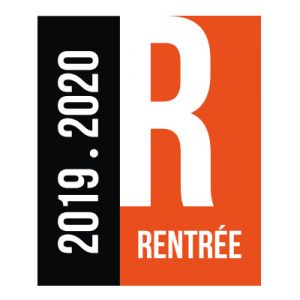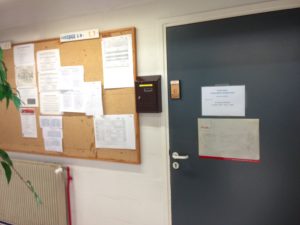General Outline
The Master 2 in Computer Science is composed of research courses (CR) from September 9, 2019 to January 20, 2020, followed by an internship from January 23 to June 15, 2020. Each course corresponds to 30 hours (typically 2 hours per week during 15 weeks, except for special courses). See details below.
Latest Information
Updated schedule and latest info will be available on the read-only password-protected pad :
https://pad.inria.fr/p/r.fe63ced1eb81edb1b8ee6bc300de5990
passwd: m2info19
List of Courses (for full description follow the link CRxx):
- CR01: Cryptanalysis, Damien Stehlé and Guillaume Hanrot (ENS Lyon)
- CR02: Combinatorial scientific optimization, Bora Ucar, Fanny Dufossé (ENS Lyon, Grenoble)
- CR03: Virtualization technologies: design and implementation, Alain Tchana (ENS Lyon)
- CR04: Advanced topics in semantics of programming language, Pierre Clairambault and Colin Riba (ENS Lyon)
- CR05: Automated deduction, and opening to distributed algorithms, Xavier Urbain and Sébastien Tixeuil (Lyon 1, Paris)
- CR06: Machine learning, Aurélien Garivier (ENS Lyon)
- CR07: Selected topics in Information Theory, Jean-Marie Gorce (INSA Lyon) and Samir Perlaza (INRIA)
- CR08: Graph-based knowledge representation (for complex systems and graph databases), Angela Bonifati and Russ Harmer (Lyon 1, ENS Lyon)
- CR09: Hidden Markov models for time series classification and filtering, Stéphane Derrode (Centrale Lyon)
- CR10: Data aware algorithms, Loris Marchal (ENS Lyon)
- CR11: Modern algorithms for symbolic summation and integration, Bruno Salvy, Gilles Villard and Alin Bostan (ENS Lyon, Inria Saclay)
- CR12: Parameterized and exact algorithms, Édouard Bonnet and Rémi Watrigant (ENS Lyon
- CR13: Quantum information and computation, Guillaume Aubrun, Andre Chailloux and Omar Fawzi (ENS Lyon) (Lyon 1, Inria Paris, ENS Lyon)
- CR14: Numerical methods for computer graphics, Julie Digne and Nicolas Bonneel (Lyon 1)
- CR15: Advanced Topics in Cryptography, Alain Passelègue (ENS Lyon)
Special courses: There are 3 special courses (SCR). The special courses also last 30 hours but instead of having 2 hours per week, they run for 6 hours on Thursdays. Hence each special course runs in ‘compressed form’ for 5 Thursdays of the semester, 6 hours each, and every third Thursday in average. See the pad for the detailed schedule.
- SCR01: Molecular programming, Nicolas Schabanel (ENS Lyon)
- SCR02: Numerical Mechanics: from Lagrangian mechanics to simulation tools for computer graphics, Florence Bertails-Descoubes, Mélina Skouras, Mickaël Ly (Inria Grenoble)
- SCR03: Topological combinatorics, Frédéric Meunier and Matěj Stehlík (Paris, Grenoble)
Pre-course Meeting: A pre-course meeting will take place on Monday, September 9, 2019 at 9.30am, Amphi B. Attendance to this meeting is mandatory for all students. The general organization of the year and a description of the courses will be provided. Courses start on Monday, September 9, at 1:30pm.
Training Period: A mandatory training period takes place from Monday, January 23 up to mid June. An information session about topics and locations for the training period will be organized in September. Basically, the goal is to research in a laboratory (anywhere on earth), write a report and make an oral presentation in the end. Training periods will be defended on June 11 and 12, 2020.
Schedule: Courses start September 9 at 1:30pm. Autumn holidays are October 28-November 3. Winter holidays are December 23-January 5. Exams will be held on week 3 (starting Monday Jan. 13), for a subset of courses. Again, the detailed weekly schedule will be available on the Inria pad mentioned above. This pad will be updated on a regular basis, check it often.
Rules of the Game: To obtain their degree, CS Master students must complete 60 credits including the internship (30 credits) and four courses (5 credits each) in the above list of CR1 to CR15 and SCR01 to SCR03. To summarize, there are 50 mandatory credits out of 60 and 10 remaining credits that can be picked elsewhere. While a typical choice by many students is 6 CR courses (regular or special) and the internship, the extra courses for the 10 remaining credits can be chosen elsewhere, e.g. CS courses in the M2 offered by Univ. Lyon 1, or courses from other ENS departments.
Complex Systems: There is an orientation ‘Complex Systems’ that provides a multi-disciplinary choice. See details at
http://www.ixxi.fr/enseignement/master_systemes_complexes
for course offering. For the validation, the rules of the game apply, so students can pick 10 credits from complex systems courses. Note that ‘Complex Systems’ is an orientation, not a separate M2. The only diploma delivered by ENS Lyon is M2 Informatique Fondamentale, and computer science must remain at the heart of the curriculum. In particular, the training period must be oriented towards research in core computer science (possibly applied to other disciplines).
Formal Validation: To meet the quality requirements of our program, all course choices must be approved by the academic tutor and the head of the Master 2 program. Administrative registration to chosen courses is mandatory and takes place in late September, after a trial period.
Please refer to the rules of the Master here
Contact: Yves Robert

 English
English
 Retrouver les informations pour la rentrée 2019-2020
Retrouver les informations pour la rentrée 2019-2020
